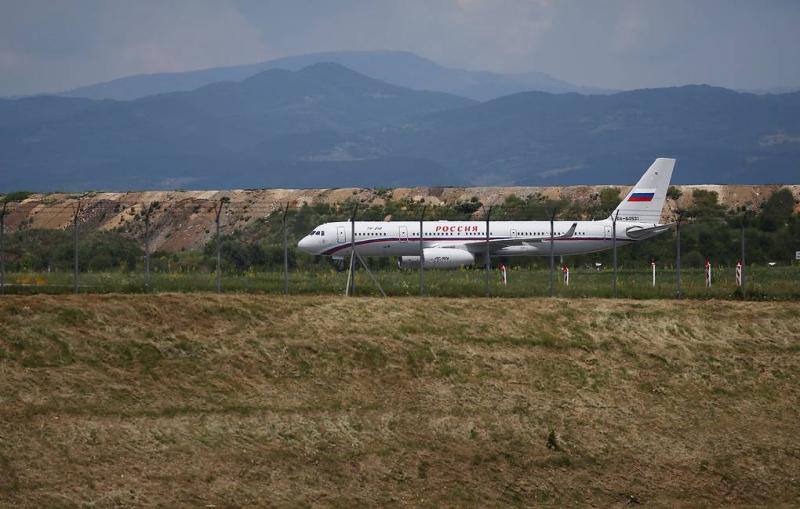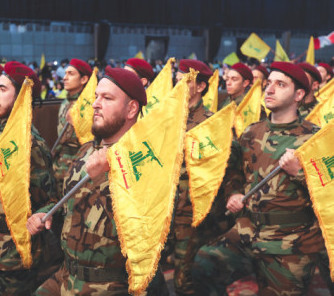
© REUTERS/Spasiyana Sergieva/TASS
Top stories from the Russian press on Wednesday, July 6th, prepared by TASS
Izvestia: Should Moscow be expecting NATO military bases in Sweden, Finland?
Thirty NATO member states signed accession protocols for Finland and Sweden. After Turkey dropped its objections against Helsinki and Stockholm joining the US-led military bloc, there are no illusions about NATO’s expansion. Obviously, Moscow will be compelled to beef up Russia’s military potential on its northern borders, regardless of whether a NATO military base appears there.
"Of course, Russia will be forced to react to Finland and Sweden joining NATO. If the alliance’s new military bases appear near Russian borders, naturally, our missiles will be pointed at these new territories as well. This choice was made by Helsinki and Stockholm on their own, they will have to live with this. And as an additional bonus for NATO membership, they will also end up with expensive energy products and inflation," member of the State Duma Committee on Security and Corruption Control Abdulhakim Gadzhiev told Izvestia.
According to Director of the Center for Analysis of Strategies and Technologies Ruslan Pukhov, Finland and Sweden became NATO’s most valuable acquisition over the past quarter of a century. If North Macedonia, Albania, Croatia and Montenegro who joined the bloc previously became security recipients rather than security donors and did not enhance NATO’s structure in any way from a military point of view, the situation is different with these two Scandinavian states.
"These are countries with capable armies, each country has its own military industrial complex. Additionally, they are strongly motivated to counteract Russia as opposed to, say, the Portuguese. The Finns think that we snatched what was their second largest city, Viipuri, now known as Vyborg, from them. The Swedes in general disliked us since the times of Peter the Great. And it is quite obvious that the accession of these countries to NATO, regardless of whether a military base appears there or not, is a serious challenge to our security," the military expert explained.
According to him, in order to counteract their entry to NATO and the subsequent looming threats, Russia needs to ramp up its military potential in neighboring regions. However, this will be a "complex and challenging task" amid the economic slowdown due to the ongoing sanctions and the continued special operation in Ukraine, so bolstering Russia’s northern flank will demand additional resources, the expert concluded.
Izvestia: How Moscow intends to retaliate against Bulgaria’s expulsion of Russian diplomats
Moscow intends to shut down its embassy in Sofia after an unprecedented expulsion of Russian diplomats from Bulgaria. A tit-for-tat response will expel the employees of Bulgaria’s diplomatic missions in Russia, a source in diplomatic circles told Izvestia. The Federation Council asserted that Russia has the right to consider any options in response to Sofia’s unfriendly actions, even going as far as cutting off ties with the country. The escalation between Russia and Bulgaria occurred soon after the Balkan state’s cabinet of ministers lost a vote of confidence and had to step down. According to experts, the new government may try to smooth over the scandal involving the purge of diplomats.
"The decision to expel seven dozen Russian diplomats is unprecedented. This is an utterly repulsive political and diplomatic move. Frankly, I cannot recall this ever happening before in countries that were at one time friendly," Chairman of the Federation Council Committee on Foreign Affairs and Ex-Deputy Foreign Minister Grigory Karasin told Izvestia. He warned that this move won’t be left without a response. Karasin noted that what awaits could be anything from recalling the ambassador to suspending or breaking diplomatic relations, and a decision will be announced in the near future.
"Departing PM [Kiril Petkov] thinks that ‘the hand of Moscow’ is involved in his ouster and apparently decided to ‘get revenge’ this way," Leading Researcher at the Russian Academy of Sciences’ Institute of Europe Pavel Kandel told the newspaper. "Actually, as I see it, through this sort of what they call excessive loyalty to Washington and Brussels, he wanted to ensure future support."
"As we see, a serious collision between the president and the government emerged and the necessity arose to form a new cabinet of ministers," Senior Researcher at the Russian Academy of Sciences’ Institute for Slavic Studies Pyotr Iskenderov explained. According to the expert, the attempt to form a new government is not likely to succeed and Bulgaria will have to hold a snap election. In his opinion, it is quite possible that with a new political layout there will be an opportunity to reverse the situation with the expulsions.
Nezavisimaya Gazeta: Vietnam to help Russia lessen dependence on China
Russian Foreign Minister Sergey Lavrov will be heading to Vietnam. During negotiations with his Vietnamese counterpart Bui Thanh Son, he will focus on strategic cooperation, as well as on the economy and defense. Bilateral relations with Hanoi became stronger during the Cold War when the Soviet Union helped Vietnam fight American intervention and Hanoi has not forgotten this. Russia supplies arms to Vietnam and extracts oil and gas from its waters. This displeases both China that has territorial disputes with Hanoi, and the US who wants to draw Vietnam into its anti-Russian coalition. According to experts, Hanoi will retain its independent stance in its relations with the great powers.
In a conversation with the newspaper, Leading Researcher of the Institute of Far Eastern Studies of the Russian Academy of Sciences Grigory Lokshin noted: "Vietnam is essential for Russia as an anchor of stable ties for the entire country and its Far Eastern region with Southeast Asia. The main role in business contacts with Vietnam is played by arms supplies and joint oil and gas projects," the expert said, pointing out that oil and gas extracted by Russian companies fulfills a significant part of Vietnam’s energy needs.
The expert noted that Vietnam adheres to two principles, "restraint and moderation", when seeking a balance in relations between Russia and the US. He also noted China’s role in the region, emphasizing that it is building artificial islands in the waters that Vietnam considers to be its own, disregarding Hanoi’s interests. "Moscow has to take this into account. In my opinion, in the Asia-Pacific region, Vietnam helps Russia avoid putting all its eggs in the Chinese basket," he concluded.
Vedomosti: Maritime treaty with Norway to be reviewed
On July 5, State Duma Speaker Vyacheslav Volodin instructed Chairman of Russia’s State Duma Committee on Foreign Affairs Leonid Slutsky to review jointly with the Russian Foreign Ministry the issue of suspending or denouncing the 2010 treaty on maritime delimitation and cooperation in the Barents Sea and the Arctic Ocean between Russia and Norway. This move was triggered by Oslo blocking cargoes for Russian settlements on Spitsbergen.
Any production in the area of the Barents Sea, which was ceded to Norway under the agreement, has not yet begun, but there really are promising areas of hydrocarbons for Norway, the proven reserves of which are depleted, notes Alexei Grivach, Deputy Director General of the National Energy Security Fund. "In 2010, the signing of the agreement was a cause for great joy for the Norwegians. In this sense, the denunciation may be a sensitive step for Oslo, although here it is also worth separately evaluating the legal possibilities and subtleties of such a decision for both sides," Grivach says.
The potential withdrawal from the treaty amid the situation around Spitsbergen would mean a sharp escalation of tensions both in the region itself and between Russia and NATO in general, says analyst with MGIMO’s Institute for International Studies Nikita Lipunov. Currently, nobody is interested in this, he thinks.
Kommersant: Norway may also reduce its gas deliveries to EU
The escalation of a workers’ strike at Norway’s oil and gas companies may lead to a 56% plunge in gas exports to Europe beginning on July 9. Almost simultaneously Russia will completely shut down its Nord Stream gas pipeline for repairs. Currently, Norway is the largest source of gas for the EU and a drop in supplies will force European countries to make a difficult choice between using gas from storage facilities or shutting down their industry. Analysts expect that given the circumstances, gas prices in the EU might hit $3,000 per 1,000 cubic meters.
According to Vygon Consulting’s Maria Belova, Norwegian gas provides 18.5% of the EU’s needs. "A reduction in the supplies due to the strikes won’t go unnoticed especially since earlier, the decline of gas imports to the EU via Nord Stream over problems with turbines amounted to 60%, and in six days the pumping of gas through the system will stop completely," she stated.
In her opinion, in this situation it is expected that the pumping of gas to Europe’s underground storage facilities will stop completely while the European governments will face a choice of whether to limit the gas usage by industrial consumers or to begin using gas in the storage facilities during mid-summer. According to the expert, in the event of an actual gas shortages, something Europe has not encountered since 2009, spot prices "may easily surpass $3,000 per 1,000 cubic meters."









